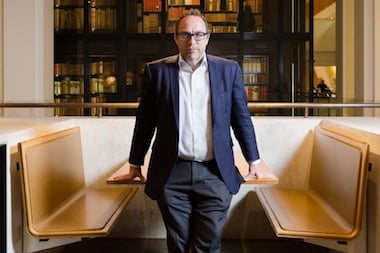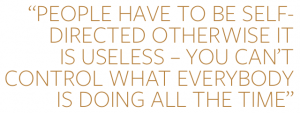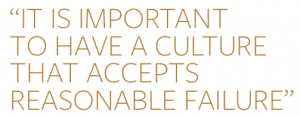Jimmy Wales: “It is Important to Have a Culture That Accepts Reasonable Failure”
Tuesday 09 February 2016
Wikipedia founder Jimmy Wales wants to rethink the way we manage people and business.
The online encyclopaedia’s entry on management says the role of a manager has “five basic functions: planning, organising, coordinating, commanding and controlling”.
For Wales, this definition is too restrictive. In particular, he’d like to change the last two functions on the list.
“The commanding and controlling aspect of management is changing substantially,” he says. “Managers need new skills, and one of those skills is delegation and allowing teams to be more autonomous in order to be more agile.” Wales favours the idea of “inspiring and coaching”.
“We no longer live in a world where you have the luxury of communicating information up the hierarchy and then once a year making a big decision. The company needs to be nimble at the end points, so you have to really think about what that means in terms of old command and control hierarchies.
“At the end of the day, management is inspiring people to do the things that need to be done,” he adds.
Our meeting takes place in the British Library, home to seminal works such as the Magna Carta and Leonardo da Vinci’s notebook.

The institution houses more than 150 million items, written in most known languages, and taking up over 625km of shelving. It still adds three mill
ion new items every year to its collection, making it an apt location for interviewing the founder of the world’s largest online encyclopaedia.
Wales puts immense thought into answering every question put to him; his responses are concise and considered. He’s an easy person to talk to, comfortable discussing anything from economic theory to computer games, while remaining keenly focused on what he personally wants to achieve.
His vision for Wikipedia is “a world in which every single person on the planet is given free access to the sum of all human knowledge”. It’s an ambitious, noble goal, made all the more extraordinary in that he wants to achieve it with a team made up mostly of volunteers.
The Alabama native, who now works and lives in central London, founded the site in 2001 and it now boasts more than 37 million articles in more than 250 languages, with 500 million people visiting its pages each month.
Much of Wikipedia’s popularity, says Wales, is down to the openness it engenders and the ability of its user community constantly to expand, update and modify content pages.
Leading and Inspiring
“The success of Wikipedia came from the fact we were a product of the dotcom crash,” he says. “We had no resources and so I didn’t have any choice but to delegate within a community, to trust that people would do the right things and to guide that process rather than to attempt to top-down command and control everything.
“This decentralisation is really organic to our model and has been a part of everything we’ve done.”
At the start of the Wikipedia project, Wales drew inspiration from the Austrian economist Friedrich Hayek who argued, to quote Wikipedia, “that a centrally planned economy could never match the efficiency of the open market”.
Wales believes that businesses must adapt to and learn from Hayek’s teachings to succeed in the modern world, even if this can at first seem alien to managers used to working in planned, corporate environments.
“Sometimes people have such an ingrained, top-down, command-and-control view,” he says, “that they have a hard time even comprehending how people can come together in small group collaboration, organise themselves, make plans and carry those plans out effectively without someone directing the work from the top.

“The ability to step back and trust people to do things and, if they aren’t doing those things, find other people who will, is the core of my management style – much more so than trying to direct people’s work.
“People have to be self-directed otherwise it is useless – you can’t control what everybody is doing all the time.”
Wales clearly has passion for the Wikipedia project and its underlying values of free speech and equality. He sees himself as a leader of people, whose role it is to inspire through positivity rather than direct and dictate.
This approach to management led to CMI recognising Wales with the Gold Medal Award for 2015, something that he says is a “great honour”.
“One of the most important jobs of a manager is to inspire people and to lead them – you can’t do that without a vision and principles,” he says. “I believe in being very positive. I don’t think negativity and yelling at people works, it just gives a lot of kickback and people don’t like that.
“My management focus is on inspiring and coaching my team, so it’s a great honour to be recognised for this with the Gold Medal Award.”
Management in a Digital Age
We should be wary of overstating the impact of technology on management practice, says Wales. He sees technology as an enabler for management rather than the next step on an evolutionary path.
“Just because we are in a digital age, I don’t think anything fundamental about management or people has changed,” he says. “People are still people, and the task of using resources efficiently and effectively has always been and continues to be important.
“There is a mistake that people sometimes make in imagining the world is changing into something completely different than it ever was before, but a lot of the basics stay the same.”
But while technology might not have changed the fundamental role of a manager, it is changing the way they carry out their work.
More than ever, managers today can adapt approaches to problems in real-time, and learn from experiments on the fly. In years gone by, such problem-solving could have taken months or years to resolve and caused untold long-lasting damage in the process.

Wales says that this means companies have to be constantly innovating and learning from their failures – otherwise they’ll be left behind in the dust created by their competitors.
“If you’re not failing at least some of the time, then you are not innovating or being risky enough,” says Wales.
“You never want an organisation to get into a position where no one is allowed to take a risk and fail, because what you are more likely to do is have the whole organisation fail as other people innovate and change faster than you do. It is important to have a culture that accepts reasonable failure.”
Such a culture requires an underlying network of systems and processes to ensure that everyone is working together in pursuit of the same primary objective, something that Wales knows well from his experience of setting up Wikipedia.
The online encyclopaedia has an array of textbook-like protocols that means, while anyone can update a page, there are strict rules that must be adhered to and a community of avid Wikipedians ready to come down heavy on anyone who steps out of line – even if that is Wales himself.
“If people imagine the software is the magic then they are missing a lot of what’s going on,” says Wales. “Opening a wiki and thinking it will turn into anything useful without some principles and ideas behind it is folly.
“The community that exists at Wikipedia is really passionate about quality. That means we have a lot of discussions and dialogues about how to achieve that, and the results are mixed but remarkable. There are always things we want to improve and I think if we ever lose that spirit of wanting to improve then we will have lost something really important.”
Jimmy Wales is a guest speaker at CMI’s annual President’s Dinner on 8 March 2016
You can read the full version of this article, including interviews with other digital leaders, in the Winter edition of Professional Manager.
Interview
At CMI, we’re hugely privileged to have contributed to many people’s management and leadership journeys. Take a look back at some of the people we’ve interviewed for some top tips and exclusive insight.
Members See More
CMI Members have access to thousands of online learning and CPD resources. Learn more about our membership benefits
Join The Community
CMI offers a variety of flexible membership solutions, tailored to your needs. Find out more and get involved in the CMI community today.
